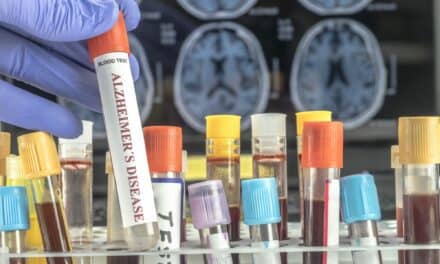Researchers say the digital assessment improves early identification of patients likely to benefit from blood biomarker testing for Alzheimer’s disease.
Researchers at Lund University in Sweden have developed a digital cognitive test designed to help primary care physicians identify patients who should receive blood biomarker testing for Alzheimer’s disease.
The BioCog test, performed by patients independently on a tablet computer, aims to improve early detection of Alzheimer’s pathology during initial clinical assessments. The study results were published in Nature Medicine.
“This digital test, which patients perform on their own with minimal involvement from healthcare personnel, improves the primary care physician’s ability to determine who should be further examined by blood tests for Alzheimer’s pathology early in the investigation phase,” says Oskar Hansson, MD, PhD, who led the study, in a release.
Addressing Primary Care Resource Constraints
The digital test addresses resource limitations in primary care settings where physicians typically have 15 to 20 minutes for patient encounters. Unlike traditional pen-and-paper cognitive assessments, the digital platform captures additional variables such as response times and screen interaction patterns.
“Primary care does not have the resources, time, or specialist knowledge to investigate possible Alzheimer’s disease in the same way as specialized memory clinics. And this is where a digital cognitive test can make the biggest difference,” says Hansson, professor of neurology at Lund University, in a release.
The test measures cognitive functions including working memory, episodic memory, processing speed, and executive function. These measurements provide objective data to help physicians determine which patients should proceed to blood testing for phosphorylated tau levels, which can detect Alzheimer’s pathology with high accuracy.
Primary Care Population Testing
The researchers evaluated the BioCog test specifically in primary care populations, distinguishing it from other digital cognitive assessments that have been tested primarily in specialized clinical settings.
“The unique aspect of our BioCog test is that unlike other digital tests, it has been evaluated in a primary care population, ie patients seeking treatment at a health center because they are experiencing cognitive problems, such as memory problems,” says Linda Karlsson, doctoral student in the Clinical Memory Research group at Lund University, in a release.
The test results, when combined with blood biomarker testing, increase diagnostic accuracy for Alzheimer’s disease, according to the researchers. This approach helps physicians identify patients who may benefit from new disease-modifying treatments, which are not effective for all patients.
Supporting Blood Biomarker Implementation
“The vast majority of people who experience memory loss will seek treatment at their health center. Our new digital test provides an objective picture—at an earlier stage and with greater precision—of which patients have cognitive impairment indicative of Alzheimer’s disease,” says Pontus Tideman, doctoral student in the Clinical Memory Research group and psychologist at the Memory Clinic, Skåne University Hospital, in a release.
The researchers note that conducting blood tests on all patients presenting with cognitive problems is not intended, as cognitive impairment can result from various conditions, including depression, fatigue, or other forms of dementia.
ID 57578429 © Syda Productions | Dreamstime.com




